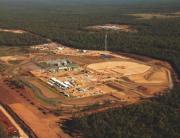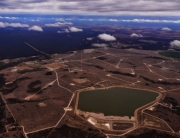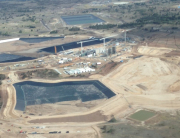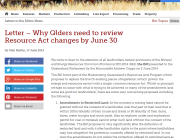Dear Editor,
The bureaucracies responsible for groundwater – and for permitting mining and CSG activities which can damage other people’s bores – have at long last conceded that the make good system needs to be reviewed.
On 15th February the Environment Department told a Parliamentary Committee considering the Water Legislation Amendment Bill that, while it believes the make good framework is operating effectively , it notes there is a range of views and it will conduct ‘an operational review’ in 2016.
Submissions by the Environment and the Natural Resources and Mines Departments at that hearing exposed their deep-seated belief that the bureaucracy reigns supreme and its mantle of protection covers all those whose water bores have been or will be damaged by mining or CSG activities.
The departments’ spokespersons are so convinced that they openly and publicly make promises such as that there is: .. statutory certainty for landholders that if their water bore is impacted by a resource sector activity it will be made good.
The technically and legally robust framework which is generally accepted as essential in commercial make good agreements is just not needed for make good government-style, they say.
Under their current legislation, if the Chief Executive (whose data I say is inadequate) forms the opinion that a bore’s supply or its water quality has materially declined because of a fall in water level due to dewatering, then the miner or CSG operator can be directed to undertake a bore assessment and implement make good measures.
Based on my experience in commercial groundwater make good agreements, I have tried very hard to get them to see that without sufficient evidence meeting the required standard of proof to show the bore is actually damaged by the dewatering , not even their Chief Executive can force a CSG operator or a miner to undertake make good – which in most cases will be costly.
In practice, official directions to CSG operators and miners without adequate supporting evidence and proof according to clearly defined, finite criteria are likely to be challenged in court. Everybody knows there are no guarantees in court.
With that blinkered view held so strongly by the departments, the promised review should be conducted independently and should have the resources to obtain both technical and legal advice from suitably qualified experts.
George Houen
Landholder Services Pty Ltd
13 Cottesloe Street
Toowoomba 4350
georgehouen@gmail.com
www.landholderservices.com.au












